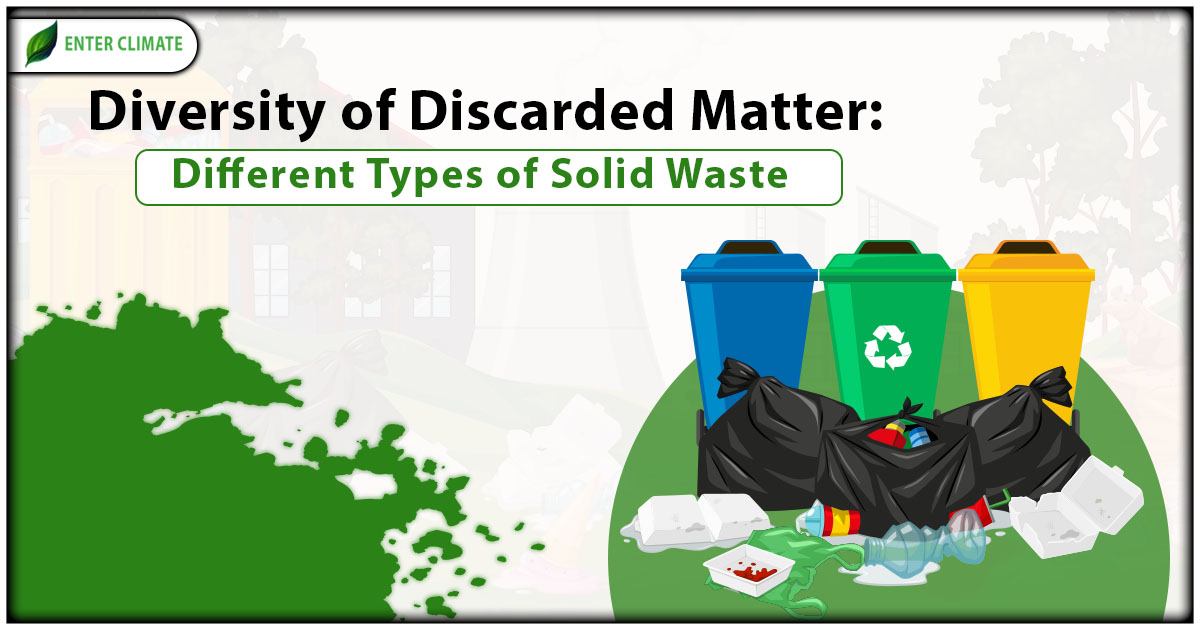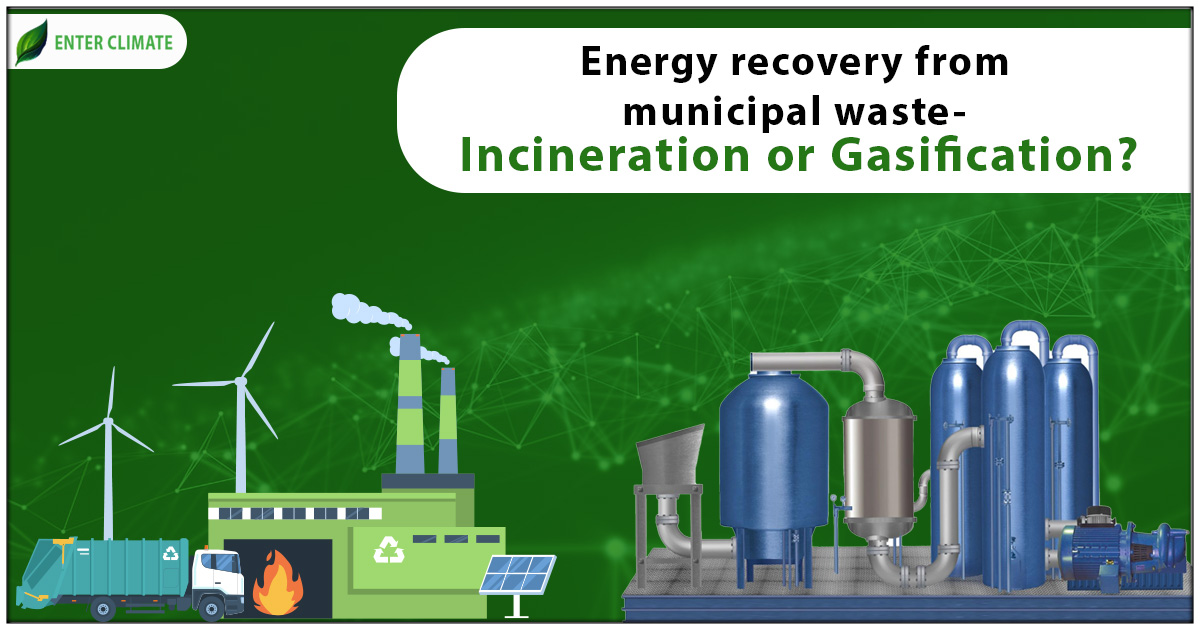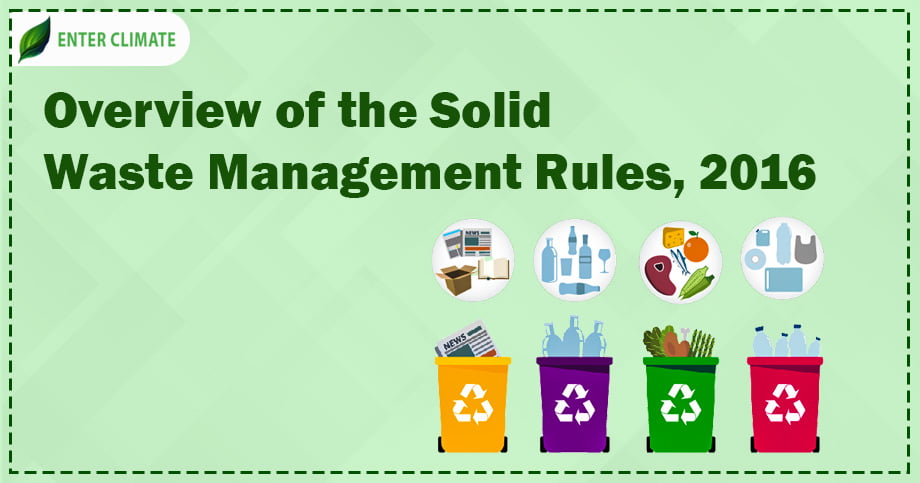Diversity of Discarded Matter: Different Types of Solid Waste
 14 Aug, 2023
14 Aug, 2023 
“Solid waste management” refers to handling and disposing of non-liquid waste materials. These wastes are collected from various sources and undergo transportation, treatment, and analysis before proper disposal. This global issue contributes to water and air pollution, impacting health, economies, and the environment. The Different Types of Solid Wastes can lead to environmental pollution and the spread of diseases carried by pests. Solid waste includes diverse materials from household, commercial, and industrial sources. Inadequate waste management, as seen in many developing cities, can cause disease transmission, sewer blockages, and other infrastructure problems. For instance, India generates 277.1 million tonnes of solid waste annually, a number projected to rise due to urbanisation and economic growth. In this write-up, we will discuss the Different Types of Solid Waste, the approach for managing such waste and the documents required for the authorisation of the Different Types of Solid Waste.
Key Points in Solid Waste Management
The essential aspects of managing different Types of Solid Waste include the following:
- Solid waste management involves the collection and treatment of solid waste materials.
- It also offers recycling solutions for items not suitable for regular disposal.
- Dealing with garbage or solid waste has been an enduring challenge in human settlements. Waste management focuses on converting solid waste into a valuable resource.
- Embracing solid waste management is vital for households and businesses worldwide.
- Urban area management relies heavily on effective solid waste management.
- Incorrect disposal of municipal solid waste can result in unhygienic conditions, contributing to pollution and the transmission of diseases through vectors.
- Technical complexities accompany the task of managing solid waste and entails economic, administrative, and social concerns that demand immediate attention.
Solid Waste Management Rules, 2016
These regulations, which supersede the 2000 Municipal Solid Wastes (Management and Handling) Rules, now have jurisdiction over urban settlements, census towns, notified industrial townships, and other areas not under municipal governance. They stress the importance of segregating waste at its source, the responsibility of manufacturers for hygienic and packaging waste disposal, and the imposition of charges on large waste producers for collection, disposal, and processing.
Furthermore, it has been advised that biodegradable waste should primarily be processed, treated, and managed on-site through composting or bio-methanation, with the remaining refuse being handed over to waste collectors or designated agencies as directed by local authorities. The guidelines promote the utilisation of compost, the conversion of waste into energy, and the modification of landfill placement and capacity specifications for the different types of Solid Waste. The government has also constituted a Central Monitoring Committee, led by the Secretary of the Ministry of Environment, Food, and Climate Change, tasked with overseeing the comprehensive enactment of these regulations. All open and active dumpsites in India are required to implement bio-remediation and bio-mining, as mandated by the Rules for the Safe Treatment of Waste.
Different types of solid waste
The Different types of solid waste are as follows:
- Household Solid Waste– Everyday items like packaging, yard trimmings, furniture, clothing, bottles, cans, food, newspapers, appliances, electronics, and batteries constitute household solid waste. As urbanisation and lifestyles change, the amount of household waste is increasing. Hazardous Materials in Residences Household hazardous substances found in homes, garages, and basements need careful handling and removal. These materials can be flammable, toxic, corrosive, or reactive, posing risks if mishandled. Various household wastes generated during daily activities like cooking and cleaning is termed domestic waste. Handling household hazardous waste with care is crucial to prevent harm to people and the environment. Storing them away from children, pets, and heat sources is advised. Storing them in their original containers with labels intact and, when possible, taking them to a domestic hazardous waste collection centre for proper disposal is recommended. Debris from Building and Demolition, Construction and demolition debris, includes uncontaminated solid waste produced during activities such as construction, renovation, repair, and demolition of buildings, utilities, roads, and land clearing. Types of such waste are o Materials like bricks, concrete, and stone; Soil and rocks; Timber (including treated, painted, and coated wood); Waste from land clearance; Drywall, plaster, plumbing fittings, and non-asbestos insulation; Various roof coverings; Asphalt pavement; Glass; non-sealed plastics.
- Industrial/Commercial Waste – Solid waste originating from manufacturing or industrial processes is termed industrial waste. Many industries dispose of their waste improperly in water bodies, leading to pollution. Examples include Fertilisers and agricultural chemicals; Inorganic chemicals; Electricity production; Iron and steel manufacturing; Leather products; Nonferrous metal production/foundries; Organic materials; Plastics and resins production; Paper and pulp manufacturing; Rubber products; Stone, glass, clay, and concrete products; Textile production; Transportation equipment; Water purification; Liquids like acids, alkalis, petroleum and derivatives; Sludges; Solidified chemicals, paints, or pigments. Commercial waste Solid waste originating from stores, offices, restaurants, warehouses, and non-manufacturing activities at industrial sites is referred to as commercial waste.
- Medical Waste – Regulated medical waste (RMW) includes materials generated during biological or healthcare research, testing, or manufacturing, such as:
- Infectious animal waste
- Human pathological waste
- Human blood and its derivatives
- Syringes and needles (sharps)
- Microbiological materials.
- Other Waste –
- Electronic Devices – Used electronic devices encompass items like computers, televisions, printers, and more, often containing hazardous elements like lead and mercury. Proper management, including potentially hazardous waste disposal, is essential.
- Discarded Oil – Used oil refers to oil that has become contaminated due to use, including automotive and industrial lubricants. Various facilities and even private residents generate used oil during DIY oil changes.
Approach for managing different types of Solid Waste
Varieties of Solid Waste Management Approaches are as follows:
Landfilling: This method involves burying waste in available spaces within a city, with the disposal site covered using soil to prevent pollution.
- Advantages: When managed effectively, it offers a sanitary waste disposal solution.
- Disadvantages: Requires a reasonably large land area.
Incineration: This process entails controlled oxidation, where high temperatures are used to thermally treat organic compounds, producing thermal energy, CO2, and water.
- Advantages: Significantly reduces the volume of combustible waste through burning.
- Disadvantages: Potential risks of smoke and fire.
Composting: Composting is a natural recycling process that converts organic matter like food scraps and leaves into valuable fertilisers, benefiting both soil and plants.
- Advantages: Eco-friendly and beneficial for crops.
- Disadvantages: Demands skilled labour for large-scale operations.
Recycling: Recycling involves converting waste materials into new products, like paper, wood, and glass recycling.
- Advantages: Environmentally friendly.
- Disadvantages: High setup costs and unreliability during emergencies.
Vermicomposting: This bio-conversion technique uses earthworms to process organic waste, producing products like vermicompost and vermiwash.
- Advantages: Reduces reliance on chemical fertilisers and enhances plant growth.
- Disadvantages: Time-consuming, costly, and requires careful management.
Harmful Effects of Different Types of Solid Waste
The harmful effects are as follows:
- Unpleasant waste odour
- Generation of harmful gases
- Deterioration of natural aesthetics
- Air contamination
- Contamination of water sources
- Environmental soil degradation
- Propagation of illnesses
- Adverse impact on biodiversity
Recycling of Different Types of Solid Waste
The recycling of waste items holds significant importance, as it transforms discarded or used products into valuable or fresh goods. This practice aids in managing air, water, and land pollution while also consuming less energy. Numerous materials, including paper, plastic, and glass, can undergo recycling. By conserving natural resources and minimising energy consumption, recycling contributes to environmental preservation. Moreover, recycling is vital in safeguarding the environment by diminishing air, water, and soil pollution.
Decomposition of Different Types of Solid Waste
Biodegradable waste has the potential to undergo decomposition and transform into organic substances through various processes.
- Composting – This technique involves decomposing and converting waste into organic matter by burying it in compost pits. Bacteria and fungi play a role in breaking down the waste.
- Vermicomposting – This approach facilitates the decomposition of organic matter into nutrient-rich fertiliser using red worms. The resulting fertiliser is termed vermicompost.
- Chemical Waste – Chemical waste pertains to waste materials derived from harmful chemicals, often produced in large industrial facilities. Chemical waste can vary in its level of hazard. Hazardous chemical waste can exist in solid, liquid, or gaseous states, exhibiting toxicity, corrosiveness, flammability, and reactivity.
Documents required for Authorisation of Different Types of Solid Waste
Within Solid Waste Management Elements, specific crucial documents play a pivotal role in ensuring the correct and lawful functioning of waste management processes. These papers are essential for validating the legitimacy and adherence of the waste management entity to diverse regulations and guidelines.
- Identification via Authorised Signatory Aadhar Card: This document functions as proof of identity for the authorised representative, who represents the waste management entity in official matters.
- PAN Card for the Authorized Signatory: The PAN card holds significance for taxation purposes and serves as an identifier for the authorised signatory in financial affairs linked to waste management activities.
- GST Certificate: The Goods and Services Tax (GST)[1] certificate is mandatory for waste management entities, ensuring alignment with tax regulations.
- Evidence of Site Ownership or Rent/Lease Agreement: This documentation verifies the ownership or tenancy status of the site where waste management actions occur. It substantiates the legal authority of the waste management entity to operate on the premises.
- Facility License/Trade License: The factory or trade license is indispensable to validate that the waste management facility adheres to legal protocols and holds proper permits for its operations.
- Electricity Statement: The electricity bill functions as proof of the operational status of the waste management facility, confirming its functional power supply for its activities.
- Layout Plan: The layout plan illustrates the spatial arrangement of the waste management facility, outlining key sections such as waste collection, processing, and disposal areas.
- Process Flow Diagram: This document delineates the sequential steps involved in waste management processes, offering a clear insight into the handling and management of waste.
- Installed Machinery Details: This information encompasses an exhaustive list of machinery and equipment employed in waste management procedures, ensuring the facility possesses the necessary tools to handle waste proficiently.
Conclusion
The diverse array of solid waste can be grouped into distinct categories based on their origins and characteristics. This classification enables effective management strategies tailored to the specific nature of each waste type. From household waste contributing to municipal waste streams to industrial waste posing potential hazards and biomedical waste requiring specialised handling to agricultural waste arising from farming practices, understanding these varied waste types is crucial for developing sustainable waste management practices. By addressing each category’s unique challenges and adopting suitable disposal and treatment methods, we can work towards minimising the environmental impact and promoting a cleaner and healthier future for our communities and the planet. It is important to take expert consultation to ensure the documents, and NOC required for the Authorization of Solid Waste Management.
FAQs
There are three categories of solid waste: Municipal Solid Waste, Hazardous Waste, and Hospital Waste. If these solid wastes are not appropriately and securely managed, they can lead to significant health issues and create an undesirable living environment.
The four categories of managing Solid Waste are Industrial Waste, Waste from commercial establishments such as stores and offices, Household Waste, and Waste originating from agricultural activities.
The approaches used for solid waste disposal encompass Landfilling, Incineration, Waste compaction, and Composting.
The three methods for solid waste disposal are Landfilling, Incineration, and Composting.
Local municipalities have embraced various techniques for waste disposal, including open dumping, landfilling, sanitary landfilling, and the establishment of incineration facilities.
The four methods of disposal of waste are Composting, Landfills, Sewage treatment, and Incineration.
The methods of sewage disposal are Facilities for treatment, Ponds for sewage, Systems on location, Systems off-site, and Comprehensive sewage systems.
The concept of solid waste management primarily pertains to the entire cycle involving the gathering, treatment, and elimination of solid wastes. This procedure includes stages such as collection, transportation, treatment, assessment, and ultimate waste disposal.
In the context of this analysis, these origins are classified into four primary waste groups: municipal solid waste, industrial waste, agricultural waste, and hazardous waste. Each of these waste categories is individually assessed in the sections below.
Solid waste can be categorised into distinct forms based on their origin: a) Household waste is commonly labelled as municipal waste, b) Waste from industries is categorised as hazardous waste, c) Medical waste or hospital waste is termed infectious waste.
Read our Article: Understanding Solid Waste Management: A Comprehensive Guide













